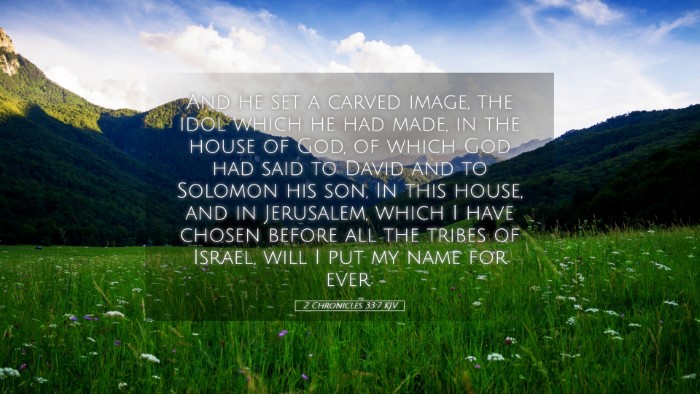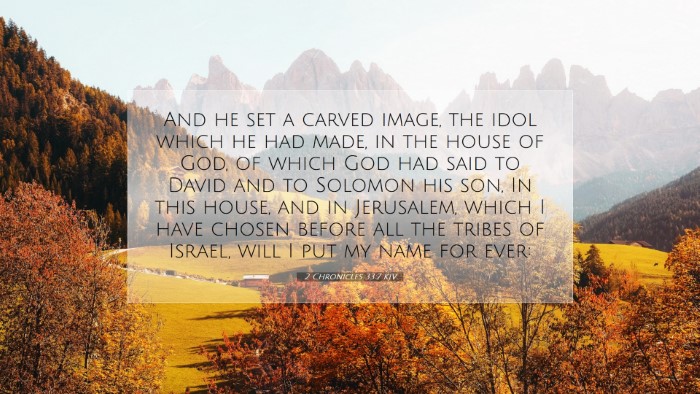Commentary on 2 Chronicles 33:7
Verse: "And he set a carved image, the idol which he had made, in the house of God, of which God had said to David and to Solomon, 'In this house, and in Jerusalem, which I have chosen before all the tribes of Israel, will I put my name forever.'
Introduction
This verse provides a profound insight into the disobedience of King Manasseh of Judah and reflects the spiritual decay that can occur when idolatry enters the sacred space of worship. It serves as a crucial point of reflection concerning the nature of worship and the sanctity of God's designated places of worship.
Historical Context
Manasseh reigned in Judah from 697 to 642 BC and is characterized in Scripture as one of the most evil kings, as noted in the preceding verses. His actions led to significant moral and spiritual decline among the people of Judah.
Exegesis of the Verse
This verse marks a pivotal moment where Manasseh places a carved image in the temple. This act directly contradicts God's commandments, which forbade the worship of idols. The contrast between God's instructions to David and Solomon and Manasseh's actions illustrates a grave violation of covenant faithfulness.
Analysis from Public Domain Commentaries
-
Matthew Henry:
Henry asserts that the idol placement represents a profound betrayal of God’s covenant. He comments on the significance of having set the image in the very house of God. According to Henry, this act demonstrated Manasseh's blatant disregard for the holiness that was to be associated with God's dwelling. He emphasizes that the temple, meant to be a house of prayer and worship, has been turned into a den of idolatry.
-
Albert Barnes:
Barnes discusses the implications of this idolatry for the nation of Judah. He points out that Manasseh’s acts led to widespread corruption and devastation for the people, who followed their king into sin. Barnes highlights the phrase "In this house, and in Jerusalem," linking the temple’s sanctity directly to God’s promises and purposes for Israel, which Manasseh violated.
-
Adam Clarke:
Clarke delves into the specific imagery and its origins. He notes that the "carved image" likely represented the pagan gods worshipped by neighboring nations, and he draws a parallel to similar acts of desecration throughout the history of Israel. Clarke emphasizes that Manasseh's idol was not merely a statue; it represented a shift away from true worship, leading the people into spiritual bondage.
Theological Insights
The actions of Manasseh in this verse provide several theological insights:
-
The sovereignty of God:
This incident underscores God's sovereign choice of Jerusalem and the temple as His dwelling place. Despite human sin, God’s plans for worship and His name endure.
-
The danger of idolatry:
Manasseh's reign illustrates the destructive nature of idolatry, not only in individual lives but also in the corporate life of a nation. The direct command from God underlines the seriousness with which He regards worship and devotion.
-
God’s justice and mercy:
While the verse depicts an extreme form of rebellion against God, the larger narrative in 2 Chronicles reveals God's willingness to forgive and restore. Manasseh's eventual repentance, as recorded later in the chapter, demonstrates God's mercy available even in the face of egregious sin.
Applications for Today
For pastors, students, theologians, and Bible scholars, the lessons from 2 Chronicles 33:7 are both cautionary and instructive:
-
The significance of spiritual leadership:
Leaders must recognize their influence on the spiritual health of their communities. The actions of the king directly impacted the worship of the people, highlighting the responsibility that comes with leadership.
-
The necessity of purity in worship:
This verse calls for introspection about what we allow in our worship settings. True worship must remain free from impurities and distractions that turn hearts away from God.
-
The promise of redemption:
Just as Manasseh found forgiveness, there is always hope for restoration and redemption for those who turn back to God, no matter the depth of their sin.
Conclusion
2 Chronicles 33:7 serves as a sobering reminder of the perils of idolatry and the seriousness of worship in the life of faith. Through the insights gained from extensive commentary, we are called to reflect on our own lives and the worship we offer to God in all its forms.


